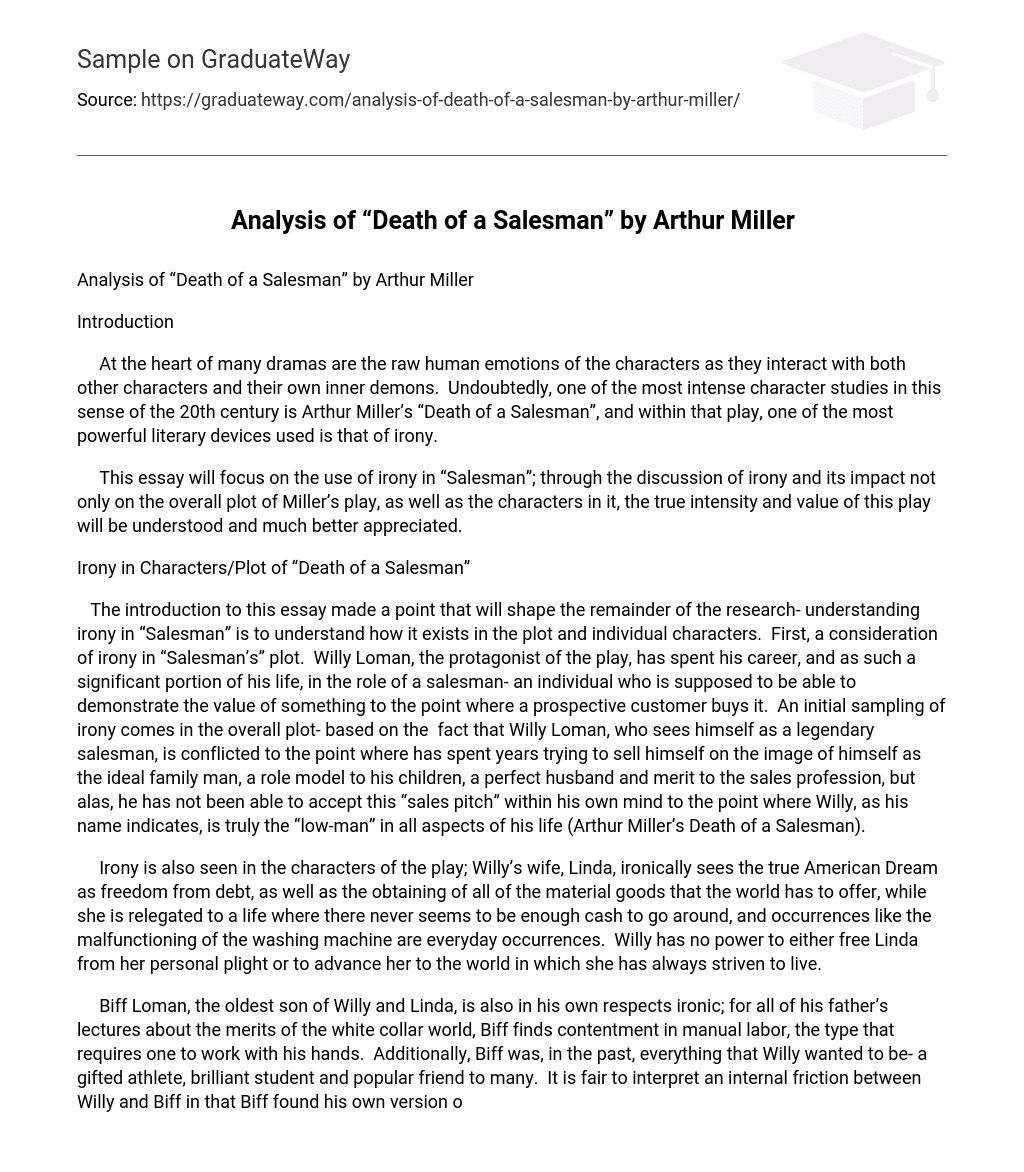Introduction
At the heart of many dramas are the raw human emotions of the characters as they interact with both other characters and their own inner demons. Undoubtedly, one of the most intense character studies in this sense of the 20th century is Arthur Miller’s “Death of a Salesman”, and within that play, one of the most powerful literary devices used is that of irony.
This essay will focus on the use of irony in “Salesman”; through the discussion of irony and its impact not only on the overall plot of Miller’s play, as well as the characters in it, the true intensity and value of this play will be understood and much better appreciated.
Irony in Characters/Plot of “Death of a Salesman”
The introduction to this essay made a point that will shape the remainder of the research- understanding irony in “Salesman” is to understand how it exists in the plot and individual characters. First, a consideration of irony in “Salesman’s” plot. Willy Loman, the protagonist of the play, has spent his career, and as such a significant portion of his life, in the role of a salesman- an individual who is supposed to be able to demonstrate the value of something to the point where a prospective customer buys it. An initial sampling of irony comes in the overall plot- based on the fact that Willy Loman, who sees himself as a legendary salesman, is conflicted to the point where has spent years trying to sell himself on the image of himself as the ideal family man, a role model to his children, a perfect husband and merit to the sales profession, but alas, he has not been able to accept this “sales pitch” within his own mind to the point where Willy, as his name indicates, is truly the “low-man” in all aspects of his life (Arthur Miller’s Death of a Salesman).
Irony is also seen in the characters of the play; Willy’s wife, Linda, ironically sees the true American Dream as freedom from debt, as well as the obtaining of all of the material goods that the world has to offer, while she is relegated to a life where there never seems to be enough cash to go around, and occurrences like the malfunctioning of the washing machine are everyday occurrences. Willy has no power to either free Linda from her personal plight or to advance her to the world in which she has always striven to live.
Biff Loman, the oldest son of Willy and Linda, is also in his own respects ironic; for all of his father’s lectures about the merits of the white collar world, Biff finds contentment in manual labor, the type that requires one to work with his hands. Additionally, Biff was, in the past, everything that Willy wanted to be- a gifted athlete, brilliant student and popular friend to many. It is fair to interpret an internal friction between Willy and Biff in that Biff found his own version of success on his own terms, seemingly going against the path his father wanted to pave for him.
Lastly, Willy’s youngest son, Happy is the essence of irony. Even his name is ironic, as Happy is very similar to his father in that he suppresses huge amounts of resentment, jealousy and anger. Additionally, he, like his father, portrays himself as more important professionally than he is in fact (Arthur Miller’s Death of a Salesman).
Conclusion-One Last Irony
In conclusion, one last Irony of “Salesman” may in fact be the biggest irony of all. For Willy Loman, it seems that the only way for him to realistically give his family the American Dream that everyone wanted would be for Willy to kill himself, and his family to benefit financially from his life insurance policy. The sad irony is that Willy would have to give his life to see his dream fulfilled. Therefore, as a final thought, it should be understood that “Death of a Salesman” represents not only physical death, but more tragically and ironically, the death of a dream.
Works Cited
Arthur Miller’s Death of a Salesman. Ed. Harold Bloom. New York: Chelsea House, 1988.





